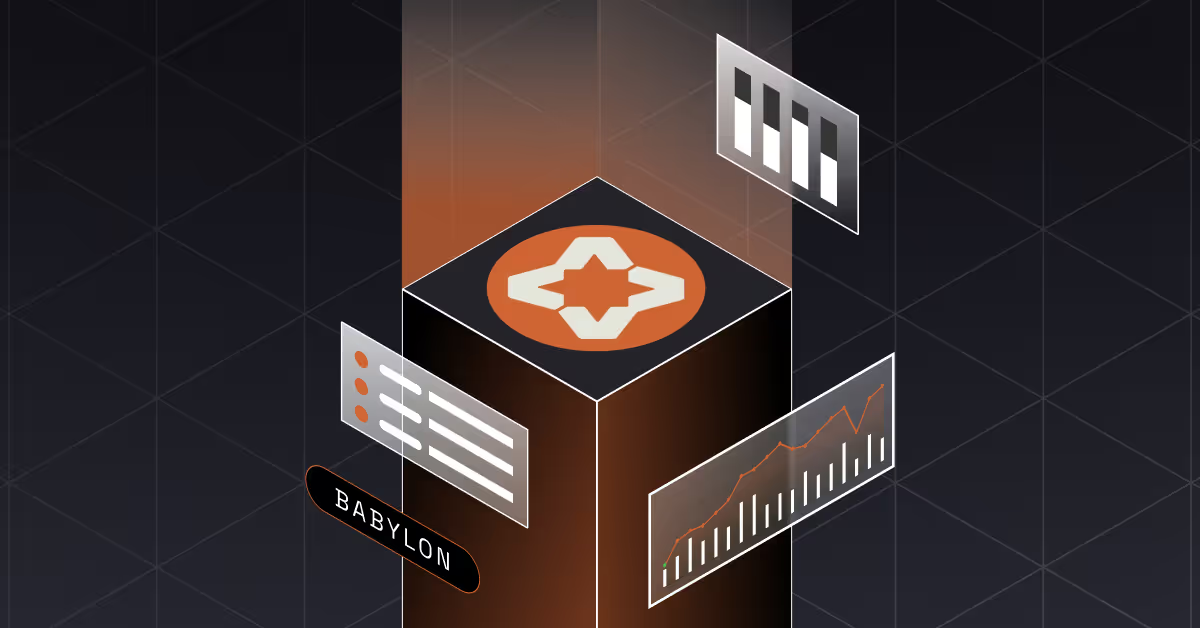Supporting The Babylon Genesis Launch
Blockdaemon now supports Babylon Genesis as a Finality Provider (FP), providing industry-leading infrastructure support for the first standalone Layer 1 (L1) Bitcoin Secured Network (BSN). This is the first network of its kind to derive its crypto-economic security from Bitcoin, via the Babylon Bitcoin staking protocol.
In this blog, you’ll get an introduction to Babylon, Babylon Genesis, and how to stake your BTC with Blockdaemon.
What Is Babylon?
Babylon is a project that bridges Bitcoin’s security into Proof-of-Stake (PoS) networks. It transforms idle Bitcoin (BTC) into an active staking asset, letting BTC holders secure rewards while boosting the security of other blockchains. Built as its own layer-1 chain using the Cosmos technology stack, Babylon introduces a unique Bitcoin staking model focused on institutional-grade security and interoperability. In essence, Babylon repurposes Bitcoin’s immense liquidity and robust security to “secure the decentralized future” by staking BTC in a trustless, self-custodial way.
Babylon’s Key Features
Babylon’s approach to staking is novel, with the following notable features:
- Decentralized Bitcoin Staking: Bitcoin can be staked to secure PoS blockchains without any centralized custody or wrapped tokens. BTC never leaves the owner’s wallet control, removing the need for bridges or third-party custodians.
- Security as a Service: Finality Providers in Babylon regularly vote on checkpoints for connected blockchains (Bitcoin Secured Networks) and commit these votes to Bitcoin’s blockchain. Once a checkpoint is embedded in Bitcoin and confirmed, it becomes economically infeasible for the BSN’s history to be reversed without also invalidating the Bitcoin record.
- Fast Unbonding: Unlike traditional staking that locks assets with variable unbonding times, Babylon lets stakers unbond (withdraw) with minimal delay - typically two days.
- Broad Compatibility: Any PoS blockchain or rollup can become a Bitcoin Secured Network by integrating with Babylon. This means they can augment their native validator security with Bitcoin-backed finality.
Babylon’s Staking Model
Babylon operates a dual-quorum staking model on Babylon Genesis. It runs on CometBFT (the Cosmos SDK/Tendermint consensus engine) and uses two types of staking roles:
- Cosmos Validators (BABY Stakers): Babylon has a set of validators (initially around 100) that stake its native token (called BABY) to produce blocks and secure the Babylon chain itself. These validators perform the usual PoS duties and ensure the chain’s uptime and integrity, similar to validators on other Cosmos-based networks.
- Bitcoin Finality Providers (BTC Stakers): In parallel, Babylon integrates a specialized set of ~60 Finality Providers who stake BTC instead of BABY. Finality Providers (FPs) are essentially Bitcoin-backed validators. They lock up BTC in the Babylon protocol and participate in finality votes for connected networks. Each Finality Provider runs both a Babylon node and monitors Bitcoin. Babylon’s consensus incorporates these providers’ votes (a “finality round”) to finalize blocks with Bitcoin’s assurance. FPs can also stake using delegated bitcoin.
This architecture marries Proof-of-Stake with Bitcoin’s Proof-of-Work-based trust. The Babylon chain frequently commits its state to the Bitcoin blockchain (approximately every hour) via a timestamping mechanism.
By anchoring data to Bitcoin’s ledger, Babylon safeguards against long-range attacks on the PoS chain (historical attacks are thwarted because the Bitcoin record serves as an immutable checkpoint), and it enables fast unbonding. Once a Babylon checkpoint is engraved in Bitcoin, stake can be safely released much sooner than conventional PoS unbonding periods.
How Bitcoin Staking Works
To become a Bitcoin staker in Babylon, a bitcoin holder locks some BTC in a special output on the Bitcoin network using Babylon’s native staking script. This on-chain Bitcoin transaction is self-custodial, meaning the user keeps their private keys and does not hand coins to anyone else. Once locked, that BTC is recognized by the Babylon chain and converted into the ability to stake. The BTC holder can then choose to either run a Finality Provider node themselves or delegate their stake to an existing Finality Provider of their choice, such as Blockdaemon. Delegation allows those without infrastructure to participate by assigning their stake to a professional node operator.
Babylon’s protocol enforces strict slashing-based accountability for these Bitcoin stakers. If a Finality Provider cheats or attempts to finalize conflicting histories (analogous to double-signing), the protocol can slash (forfeit) the BTC that was staked with that provider. Slashing is automatic and trust-minimized. Misbehavior triggers a pre-signed Bitcoin transaction that penalizes the offender’s locked BTC. Importantly, honest participants are protected. A BTC staker’s funds cannot be taken as long as neither the staker nor their chosen validator misbehaves. Even if the Babylon chain itself were compromised, the design ensures that an honest staker’s bitcoin remains secure under their control.
Conclusion
Babylon turns BTC from a passive “digital gold” into an active stake that secures networks, generates rewards, and acts as a root of trust for PoS blockchains. It combines the unmatched security and liquidity of Bitcoin with the growing staking economy.
Today, over 50,000 BTC has been staked through Babylon’s protocol, with over 200 Finality Providers. While this represents just ~0.3% of Bitcoin’s supply, it shows the appetite for Bitcoin staking products amongst BTC holders.
To get started with bitcoin staking today, reach out to the Blockdaemon team.



































































